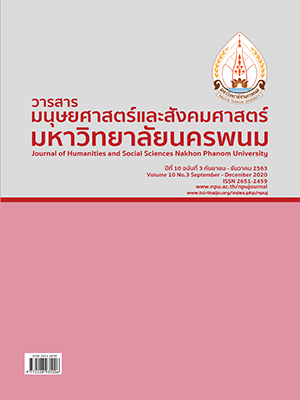Educational Leadership in Disruption Era with Thailand Educational Directions
Main Article Content
Abstract
In recent years, disruption has been the topic of interest. Disruption is a phenomenon which occurs in many fields, including mass communication, banking and finance, the entertainment industry, real estate, food industries, textiles, public health, and education in particular. Disruption is an alarming wave of change, for example, the replacement of human labor with robots, the use of internet banking, food delivery, and online newspapers. More importantly, disruption also has major influences on the field of education, with disruptive educational leadership having been employed as an essential mechanism to prevent and solve educational disruption in Thailand. Nonetheless, as the backbone of society, educational institutions must be aware, prepared, and ready to adapt to changes in the era of disruption. These institutions should change through trial and error and learn from their mistakes. If such organizations effectively monitor changes and prepare themselves, they will be able to overcome the barriers they encounter and ultimately reduce administrative errors.
Article Details
References
Baker, D. S. (2007, August). “Followership: the theoretical foundation of a contemporary construct,” Journal of Leadership & Organizational Studies. 14(1), 50-60.
Bass, B. M. (1997). “Does the transactional-transformational leadership paradigm transcend organizational and national boundaries?,’ American Psychologist. 52(2), 130-137.
Burns, J. M. (1998). Foreword. In J. B. Ciulla (Ed.), Ethics, the heart of leadership (pp. ix–xii). Westport, CT: Praeger.
Hoque, F. (2015, September). 5 habits of truly disruptive leaders. Fast Company Magazine. Retrieved November 18, 2019, from https://www.fastcompany.com/3052725/5-habits-of-truly-disruptive-leaders
McFarland, J. L., Senn, E. L., & Childress, R. J. (1993). 21st century leadership: dialogues with 100 top leaders. New York: Leadership Press.
Heyck-Merlin, M. (2016). The together leader: get organized for your success - and sanity!. New Jersey: Jossey-Bass.
McCorkle, C. O. & Archibald, Jr, S. O. (1982). Management and leadership in higher education. San Francisco: Jossey-Bass.
Neck, P. C., Manz, C. C. & Houghton, D. J. (2017). Self-leadership: the definitive guide to personal excellence. USA: Sage Publications.
Adulyanon, S. (2018). When the world changes how to handle the era of technology disruption. Retrieved October, 2019, from https://www.thebangkokinsight.com/51729/
Hong-radaromph, J. (2018). Turn knowledge and ideas into action and take action. Retrieved December 15, 2019, from https://www.ryt9.com/s/nnd/2929083
Kananuraksa, N. (2009). Leadership role for producing professional employees. University of the Thai Chamber of Commerce Journal: humanities and social sciences. 29(4), 136-146.
Panich, W. (2013). Enjoy learning in the 21st century. Bangkok: sodsri-saritwong foundation.
Suanpleang, P. (2013). Information technology and innovation for knowledge management. Bangkok: Se-Education.
Tangkitwanit, S. (2018). Development model to solve difficult problems of the country in the age of technological disruption. Retrieved May 14, 2019, from https://tdri.or.th/2018/05/annual conference2018/


